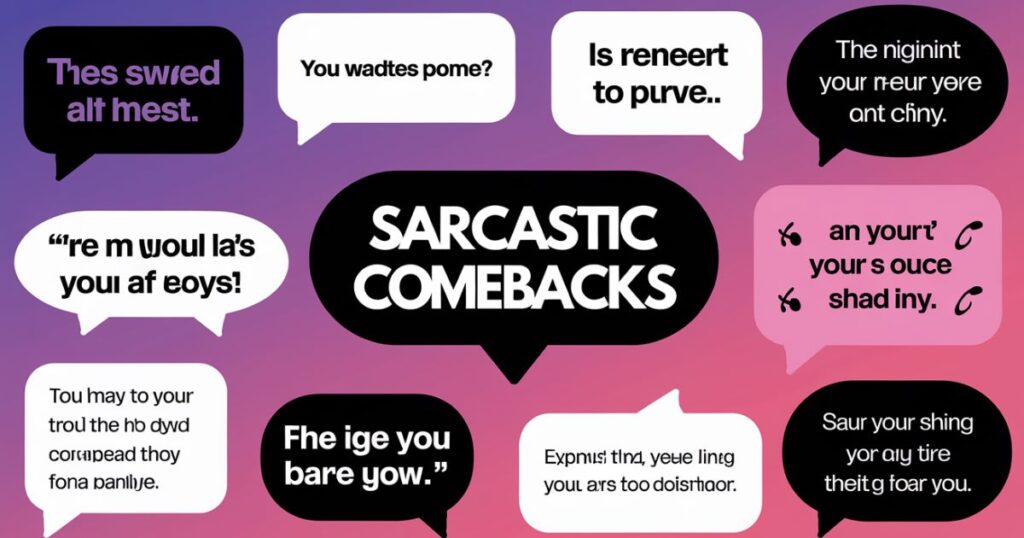Savage comebacks are powerful tools in any argument. They can turn the tide and leave your opponent stunned. A well-timed comeback not only asserts your confidence but also shows your cleverness. The right words can cut through any tension, making it clear that you won’t be easily silenced.
Using savage comebacks effectively requires wit and timing. It’s essential to stay calm and collected while delivering your response. A quick, sharp retort can leave your opponent speechless. By mastering these comebacks, you can navigate arguments with style and assert your position without unnecessary conflict.
Best Comebacks in an Argument
When you find yourself in an argument, having a few great comebacks ready can help. A quick response can turn the tide in your favor. It shows you are confident and sharp.
Some of the best comebacks are clever and funny. They make your point without escalating the argument. A well-timed sassy line can leave your opponent speechless.
Examples of Witty Comebacks
One effective comeback is, “I’d agree with you, but then we’d both be wrong.” This response is light-hearted yet impactful. It shows you can joke while standing your ground.
Another good option is, “I’m not arguing; I’m just explaining why I’m right.” This statement is assertive and keeps the conversation playful. Using these witty comebacks can help you navigate arguments with ease.
- “I’m not arguing; I’m just passionately expressing my point of view.”
- “If I wanted to hear from a know-it-all, I’d just read your social media posts.”
- “That’s an interesting perspective. I’d like to hear how you came up with it or if you did.”
- “I’d explain it to you, but I left my English-to-Dingbat dictionary at home.”
- “You’re entitled to your opinion. Just not your own facts.”
- “I’m not saying you’re wrong, but you’re definitely not right.”
- “Let’s agree to disagree. I’d hate for you to have to be right all the time.”
- “I’m sorry, I can’t hear you over the sound of how awesome I am.”
- “That’s cute. Now, back to the real issue.”
- “You’re welcome to think that, but I’m still going to be right.”
Savage Comebacks in an Argument Over Text

When arguments happen over text, things can get heated quickly. Savage comebacks are a fun way to respond and show you’re not backing down. A sharp reply can shift the tone and put the other person in their place.
It’s important to keep it light, even when you’re frustrated. Use witty responses that are clever but not mean. The goal is to win the argument while still having a good laugh.
- “I’d explain it to you, but I left my English to Dingbat dictionary at home.”
- “Are you always this annoying, or is today a special occasion?”
- “I’d agree with you, but then we’d both be wrong.”
- “I’m not saying you’re stupid; I’m just saying you have bad luck when it comes to thinking.”
- “I’m not arguing; I’m just explaining why I’m right.”
- “I’m trying to see things from your perspective, but I can’t get my head that far up my own butt.”
- “I’m busy right now, can I ignore you some other time?”
- “I’d call you a tool, but that implies you’re useful.”
- “You bring everyone so much joy when you leave the room.”
- “Sorry, I can’t hear you over the sound of how awesome I am.”
- “You have the right to remain silent because whatever you say will probably be stupid.”
- “Oh, I’m sorry. I didn’t realize you were an expert in my life and how I should live it.”
- “I’m not saying you’re wrong; I’m just saying you’re not right.”
- “I’d respond, but I’d rather talk to a rock. At least it wouldn’t argue back.”
- “You’re like a software update. Whenever I see you, I think, ‘Not now.'”
- “I’d explain it to you, but I’m not allowed to insult your intelligence.”
- “You’re proof that even evolution makes mistakes.”
- “Somewhere out there, a village is missing its idiot.”
- “I could eat a bowl of alphabet soup and crap out a smarter argument than that.”
- “You must have been born on a highway, because that’s where most accidents happen.”
Sarcastic & Sassy Comebacks For Arguments

In arguments, sarcastic lines can catch someone off guard and end the debate quickly. Sassy comebacks add humor while shutting down the opposition. The right words at the right time show confidence and wit.
- “Oh, I’m sorry, did the middle of my sentence interrupt the beginning of yours?”
- “I’d agree with you, but then we’d both be wrong.”
- “Keep talking, maybe one day you’ll say something intelligent.”
- “I’m not arguing, I’m just explaining why I’m right.”
- “I’m sorry, what language are you speaking? Because it sounds like nonsense.”
- “Your opinion is noted and ignored.”
- “I’d love to stay and chat, but I have more important things to do, like breathing.”
- “I guess you can’t help it, after all, everyone makes mistakes.”
- “Oh, I see your point. It’s ridiculous, but I see it.”
- “I’d explain it to you, but I left my crayons at home.”
Good Comebacks And Roasts In An Argument

A good comeback can quickly shift an argument in your favor. It’s about staying calm and delivering a smart reply. Clever comebacks can shut down the other person while keeping things light.
- “I’m sorry, did the middle of my sentence interrupt the beginning of yours?”
- “You bring everyone so much joy when you leave the room.”
- “I could agree with you, but then we’d both be wrong.”
- “I’m not arguing, I’m just explaining why I’m right.”
- “Your secrets are safe with me. I wasn’t even listening.”
- “I’d explain it to you, but I left my crayons at home.”
- “You have your entire life to be a genius. Don’t start today.”
- “Somewhere out there, a tree is producing oxygen for you. You owe it an apology.”
- “I’m not insulting you, I’m describing you.”
- “I see you’ve set aside this special time to lower the quality of this conversation.”
Witty Comebacks For Arguments
Witty comebacks can quickly turn an argument in your favor. A sharp, clever response leaves your opponent speechless. Always keep your words short and to the point for maximum impact.
- “Oh, I’m sorry, did the middle of my sentence interrupt the beginning of yours?”
- “I’m not arguing, I’m just explaining why I’m right.”
- “Let me know when you’re done making no sense.”
- “You bring everyone so much joy when you leave the room.”
- “I could agree with you, but then we’d both be wrong.”
- “Thanks for the input, but I wasn’t asking for your opinion.”
- “I’m not ignoring you, I’m just giving you time to think about what you said.”
- “If I wanted to listen to nonsense, I’d watch TV.”
- “Are you always this annoying, or is it a special occasion?”
- “Calm down, I’m not smart enough to argue with you.”
Read Also: Say Thank You to Your Bus Driver: 50+ Messages of Appreciation
Savage Comebacks To a Guy or Boy During Arguments

When a guy tries to put you down, hit back with confidence. A savage comeback can quickly shut him down. Stay calm and let your words do the talking.
For example, if he says something rude, reply with, “Is that the best you’ve got?” This shows you’re not easily shaken.
Another sharp line is, “I’d agree with you, but then we’d both be wrong.” It’s clever and leaves him speechless.
- “I’m sorry, I didn’t realize you were an expert in everything.”
- “I’d agree with you, but then we’d both be wrong.”
- “Are you always this annoying, or is today special?”
- “I’m not arguing, I’m just explaining why I’m right.”
- “Oh, I’m sorry. Did my confidence offend your insecurity?”
- “Keep talking, maybe you’ll say something intelligent eventually.”
- “Thanks for your input, now I know what not to do.”
- “Do you ever listen to yourself, or is it just for show?”
- “Your opinion might matter if I cared.”
- “Wow, you sound better with your mouth closed.”
Savage Comebacks To a Girl In Arguments
When a girl throws shade, hit back with a quick, sharp line. A well placed savage comeback can stop the argument in its tracks. Keep it cool, and make your point without being overly harsh.
- “I’m sorry, I didn’t order a side of attitude.”
- “I’d agree with you, but then we’d both be wrong.”
- “Are you always this dramatic, or is today special?”
- “Keep rolling your eyes, maybe you’ll find a brain back there.”
- “I’m not arguing, I’m just explaining why I’m right.”
- “It’s cute how you think you’re winning this.”
- “I’d explain it to you, but I left my crayons at home.”
- “Your opinion is noted, and promptly ignored.”
- “You bring a lot to the table just not in this conversation.”
- “I’m not ignoring you, I’m just giving you time to make sense.
The Greatest Comebacks in Argument History

Some of the greatest savage comebacks happened in public debates. These sharp retorts shut down opponents with quick, clever responses. Moments like these stay memorable because of their wit and timing.
Witty roasts have been used by famous figures to win arguments effortlessly. A well placed sarcastic line can instantly turn the tide in any discussion. These remarks often leave the other side speechless.
Politicians and celebrities often rely on great comebacks in interviews. A sassy line or two can shift public opinion. These witty responses are designed to outsmart and win over crowds.
- “Winston Churchill was known for his sharp retorts, often silencing his critics with ease.”
- “Muhammad Ali delivered some of the most iconic sassy comebacks in sports history.”
- “Mark Twain’s witty responses in debates made him famous for his quick-thinking humor.”
- “Oscar Wilde’s clever responses turned arguments into legendary moments of wit.”
- “Margaret Thatcher’s savage comebacks during political debates made her a formidable figure.”
- “Steve Jobs used witty comebacks to outsmart competitors in tech interviews.”
- “Abraham Lincoln’s sarcastic lines often shut down opponents in heated discussions.”
- “Joan Rivers mastered witty roasts that left no room for rebuttals.”
- “Muhammad Ali’s great comebacks were as sharp as his punches in the ring.”
- “Comedians like Groucho Marx were experts in shut down responses that left crowds laughing.”
How to Shut Someone Down in an Argument?
In any argument, staying calm is key. Speak clearly and maintain control of your emotions. Confidence shuts down the other person without escalating the situation.
Use a Sharp Comeback
A quick, witty response can end the argument fast. Choose your words wisely to cut through the noise. A sharp comeback leaves no room for further debate.
End with a Final Statement
Make your point, then stop. After delivering your final statement, walk away or change the subject. This shuts down the argument completely.
- Stay Calm: Keep your cool to avoid escalating the argument. A calm demeanor can disarm your opponent.
- Listen Carefully: Understand their points before responding. This shows you’re engaged and helps you formulate a better rebuttal.
- Use Facts: Back up your claims with data or evidence. Facts are harder to argue against than opinions.
- Ask Questions: Pose questions that challenge their argument. This can expose flaws in their reasoning.
- Stay Focused: Stick to the main topic. Avoid getting sidetracked by unrelated issues.
- Be Witty: Use a clever comeback to lighten the mood and make your point. Humor can diffuse tension.
- Keep It Short: Make your points concisely. Long winded arguments can lose impact and make you seem less confident.
- Don’t Personalize: Focus on the argument, not the person. This prevents the conversation from becoming personal and hostile.
- Know When to Walk Away: If the argument goes nowhere, it’s okay to disengage. Sometimes, silence speaks volumes.
- End Strong: Finish with a powerful statement that reinforces your point. A strong ending leaves a lasting impression.
How to Win an Insult Argument?

Stay calm and don’t let emotions take over. Use witty comebacks to counter insults. A well placed sassy line can turn the tables in your favor.
The Power of a Well-Timed Comeback
A well timed comeback can change the course of a conversation. It shows confidence and quick thinking. Use it to assert yourself and keep the discussion lively.
Conclusion
In conclusion, savage comebacks are powerful tools in any argument. They not only showcase your wit but also help you assert your point effectively. By mastering the art of a witty roast or a sharp retort, you can leave your opponent speechless.
Remember, timing and delivery are key. Use sassy lines wisely, and you’ll not only win the debate but also earn respect. Embrace these clever responses to navigate conversations with confidence and style.
FAQ’s
What are savage comebacks?
Savage comebacks are quick, witty, and often humorous responses designed to shut down an opponent in an argument. They highlight cleverness and assertiveness, leaving the other person speechless.
When should I use a savage comeback?
Use a savage comeback when you want to regain control of a conversation or counter an inappropriate remark. Timing is crucial; deploy it when the moment is right to maximize impact.
How can I come up with effective comebacks?
To craft effective comebacks, practice thinking on your feet. Observe humor in daily life, gather funny phrases, and tailor responses to specific situations to make them relatable and impactful.
Are savage comebacks appropriate in all situations?
Not all situations call for savage comebacks. Use them wisely in informal settings where humor is welcomed. In serious discussions, they may come off as disrespectful or unprofessional.
Can savage comebacks damage relationships?
Yes, using savage comebacks can strain relationships if taken too far. It’s essential to balance humor with respect. Always consider the other person’s feelings to avoid unnecessary conflict.






